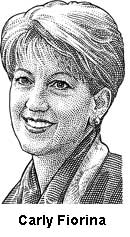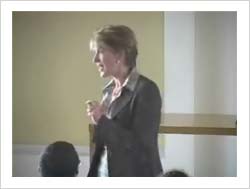According to Larry Elder, who boldly proposes that George McGovern--yes THAT George McGovern--speak at the upcoming Republican National Convention.
What would make Larry Elder say this? According to him, McGovern, after leaving the Senate, went into business--and wised up the hard way:
What would make Larry Elder say this? According to him, McGovern, after leaving the Senate, went into business--and wised up the hard way:
McGovern went into business for himself — and went bust.
Following the recommendation of a friend with "a lifetime of hotel- and restaurant-management experience," McGovern bought a small hotel and restaurant, the Stratford Inn in Connecticut. He poured his savings into the place, investing his seven year's worth of post-Senate earnings from the lecture circuit.
A contributing factor to the failure, according to McGovern, was the regulations that make it tough to make a profit. In a mea culpa that should chill every lefty on the Hill, McGovern said: "I wish I had known more firsthand about the concerns and problems of American businesspeople while I was a U.S. senator and later a presidential nominee. That knowledge would have made me a better legislator and a more worthy aspirant to the White House. ... I learned first of all that over the past 20 years America has become the most litigious society in the world. ... The second lesson I learned by owning the Stratford Inn is that legislators and government regulators must more carefully consider the economic and management burdens we have been imposing on U.S. businesses. ... Many businesses, especially small independents such as the Stratford Inn, simply can't pass such costs on to their customers and remain competitive or profitable."
"I wish I had known more firsthand about the concerns and problems of American businesspeople."
Holy Ayn Rand! Then in the spring of 2008, McGovern wrote an article called, "Freedom Means Responsibility":
"Many people can't afford the gold-plated health plans that are the only options available in their states," wrote McGovern. "Buying health insurance on the Internet and across state lines, where less expensive plans may be available, is prohibited by many state insurance commissions. Despite being able to buy car or home insurance with a mouse click, some state governments require their approved plans for purchase or none at all. It's as if states dictated that you had to buy a Mercedes or no car at all."
This is, of course, exactly what Republicans, pre-ObamaCare, offered as one of the ways to increase the affordability of health care insurance — without further government intrusion.
McGovern, in warning about excessive regulation, sounded almost Reaganesque: "Since leaving office, I've written about public policy from a new perspective: outside looking in. I've come to realize that protecting freedom of choice in our everyday lives is essential to maintaining a healthy civil society.
"Why do we think we are helping adult consumers by taking away their options? We don't take away cars because we don't like some people speeding. We allow state lotteries despite knowing some people are betting their grocery money. Everyone is exposed to economic risks of some kind. But we don't operate mindlessly in trying to smooth out every theoretical wrinkle in life.
"The nature of freedom of choice is that some people will misuse their responsibility and hurt themselves in the process. We should do our best to educate them, but without diminishing choice for everyone else."
McGovern did a lot of damage while in Congress. Here's a chance for him to help undo some of it. For the sake of the country, McGovern should share his hard-earned wisdom — at the Republican National Convention.
Invite him, Mitt. If he can't make it, then quote him.












